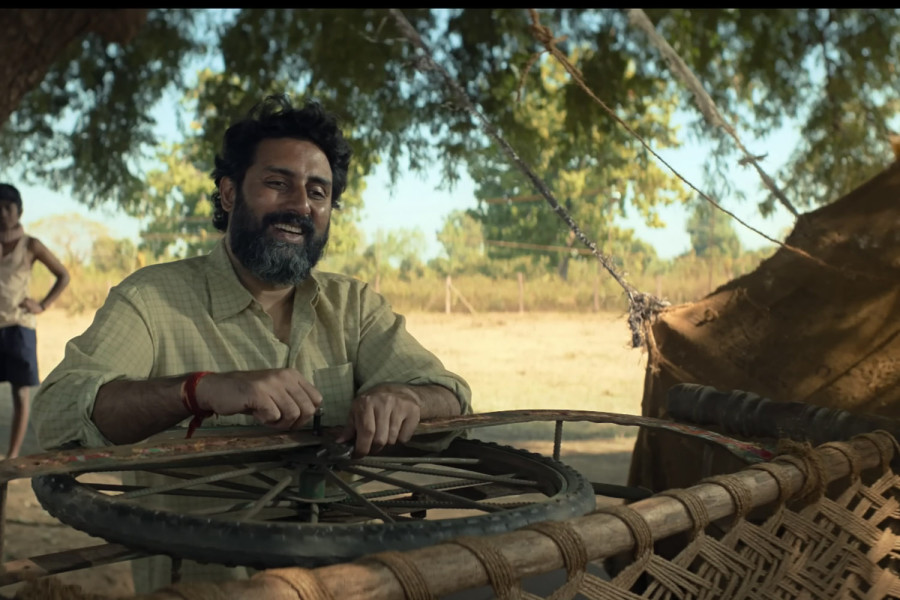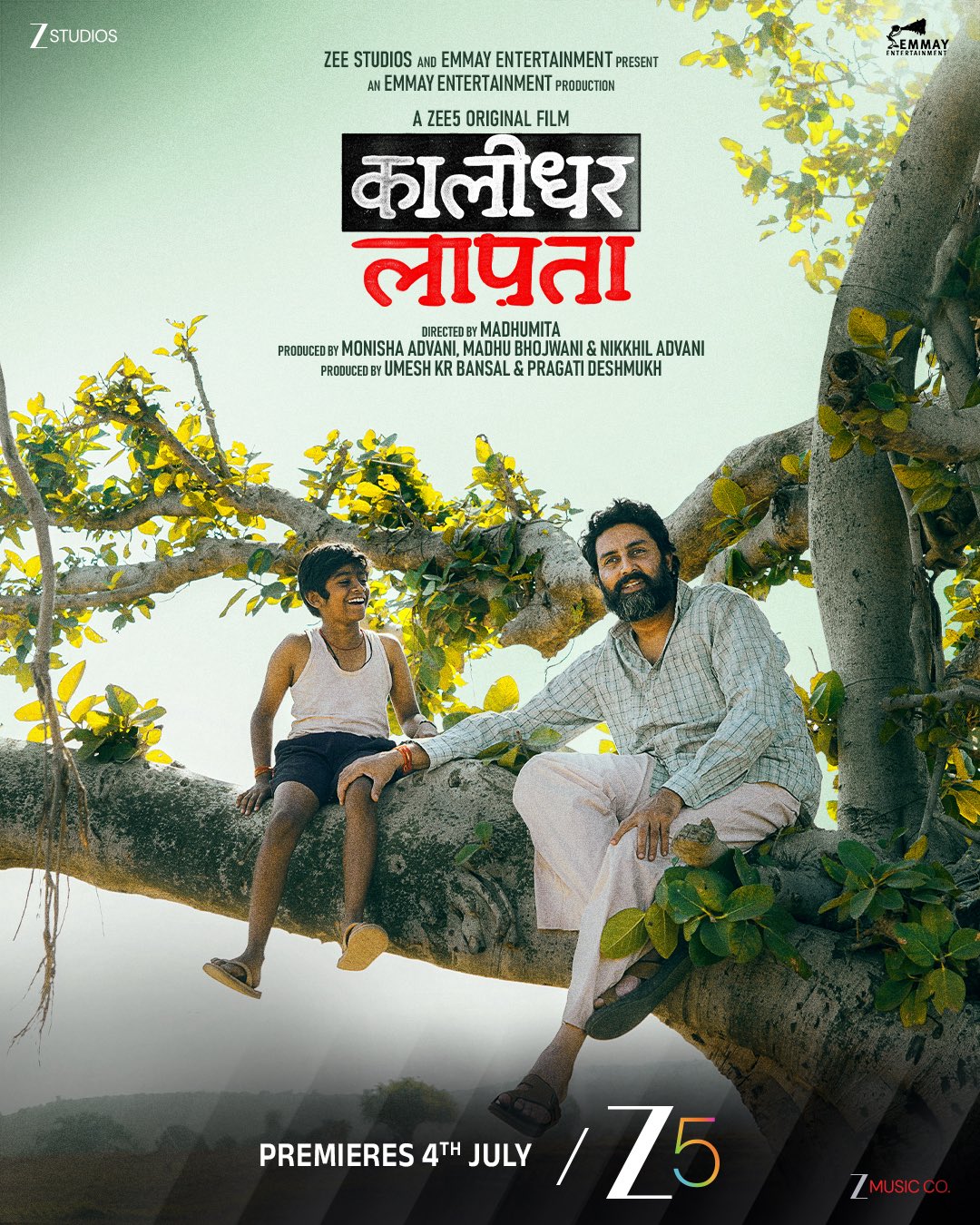Movies
‘Kaalidhar Laapata’: A story of inter-generational friendship
In his latest movie, Abhishek Bachchan portrays a man abandoned by his family who finds hope in the companionship of a young orphan.
Reeva Khanal
‘Kaalidhar Laapata’ is the Hindi remake of the 2019 Tamil film ‘KD’, directed by Madhumita Sundararaman. This film marks her debut in Hindi cinema. The movie opens with a striking scene of Kaalidhar, played by Abhishek Bachchan, standing confused and surrounded by ambulances—a metaphorical representation of his troubled mental and emotional state. The story follows a man experiencing early memory loss who is abandoned by his family in the crowded Kumbh Mela.
Kaalidhar is the eldest sibling in a lower-middle-class family, attached to his two brothers and sister. However, he suffers from memory lapses—early signs of cognitive decline—which begin to frustrate his family. His sister-in-law grows resentful, referring to his condition as “Ameeron ki bimari” (the sickness of the privileged).
The family, burdened financially and emotionally, makes a cold-hearted decision. After admitting him to the hospital and coercing him into signing property papers, they abandoned him during the Kumbh Mela, planning it as a quiet disappearance. Kaalidhar, unaware at first, overhears their conversation, realising the very people he loves have given up on him.
Lost and devastated, he wanders into the unknown, eventually boarding a bus with no destination or money. He reaches Bhojpur’s Shiv Mandir, where his path crosses with Ballu (Daivik Baghela), a lively, sharp-witted orphan who names him KD. Ballu, left by his parents as a newborn, finds a home in Kaalidhar. Their conversations about “leaving” and “being left” become the emotional spine of the film.
Sundararaman weaves a tender tale of intergenerational friendship, in which a child teaches a forgotten elder how to live again. KD and Ballu’s bond is heart-warming—Ballu becomes the family KD never had. In turn, KD gives Ballu affection and trust.
Cinematographer Gairik Sarkar beautifully frames the film, whose straightforward work captures everything from the crowded chaos of the Kumbh Mela to the quiet intimacy of temple courtyards and country roads. Among the supporting cast, Kaalidhar’s younger brothers, portrayed by Vishwanath Chatterjee and Priyank Tiwari, bring out the cruelty of familial betrayal as they conspire to cast him aside.
At the same time, Madhulika Jatoliya, as the sister, adds emotional weight when the family dynamics come to a head. Mohammed Zeeshan Ayyub, as Subodh, plays a gentle, conflicted officer whose quest to find Kaalidhar is driven as much by his longing as by duty, not to mention his wife’s hopes for their child.
While the film sensitively handles themes of loneliness, sacrifice, and unexpected friendship, it does have some flaws. The flashbacks included to explain Kaalidhar’s past and motivations are brief and sometimes unclear, and the characters' journeys could have been explored in more depth to better engage viewers emotionally. Despite these gaps, the performances and the depiction of the Kumbh Mela bring authenticity to the story.
Meera (Nimrat Kaur) appears as Kalidhar’s long-lost love—someone he once deeply cared for but could not choose due to the weight of family responsibilities. In his previous life, family duties prevented him from choosing love. But by the film’s end, empowered by Ballu’s companionship and clarity, KD finds the courage to reconnect with Meera, signifying emotional rebirth.

Ballu, too, finds a new beginning when a local priest offers to sponsor his education. In a symbolic act of closure, KD submerges himself in the holy waters of the Kumbh Mela, not to disappear, but to emerge anew.
Bachchan delivers one of his most restrained and moving performances in ‘Kaalidhar Laapata’, portraying the protagonist’s innocence, confusion, and awakening with quiet depth.
Daivik Baghela, as Ballu, is a character who carries the soul of the film, while Nimrat Kaur, despite her limited screen time, brings grace and weight to the role of Meera.
Director Madhumita handles the film with sensitivity, using silence, real-life settings, and emotionally symbolic spaces—from hospital corridors to temple courtyards—to shape a heartfelt narrative. Though the story may feel familiar at times and the pacing dips occasionally, the sincerity in her storytelling makes it truly resonate. The cinematography captures the contrast between the noisy chaos of abandonment and the calm of rediscovery, with the Kumbh Mela sequences standing out in their authenticity.
Amit Trivedi’s music gently lifts the emotional scenes without becoming overwhelming, while the dialogues remain rooted in everyday emotion, especially Ballu’s lines, which are sharp and memorable.
This film will deeply resonate with those who have loved their families wholeheartedly, especially the elderly who give their all, only to find themselves cast aside. It reflects the painful reality of betrayal by the people one trusts the most.
The film beautifully explores the intergenerational connection between two souls who, despite the age gap, become each other’s emotional support. Often, we assume only people of our own age or background can understand us, but this story proves otherwise. Ballu becomes Kaalidhar’s companion, his strength, and the one who helps him accomplish a list of wishes he had long forgotten. It is in this pure and simple friendship that Kaalidhar finds purpose once again—and in doing so, reminds us that sometimes, the people we least expect can offer the deepest love.
________
Kaalidhar Laapata
Director: Madhumita
Cast : Abhishek Bachchan, Mohammed Zeeshan Ayyub, Daivik Bhagela, Nimrat Kaur
Duration: 1 hr 49 minutes
Language: Hindi
Year: 2025




 9.83°C Kathmandu
9.83°C Kathmandu












